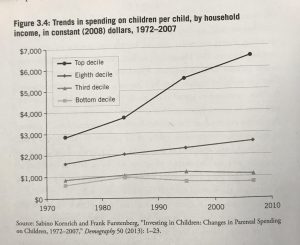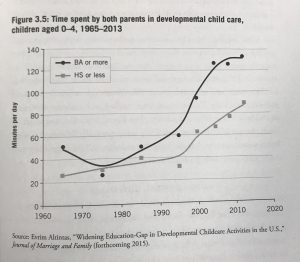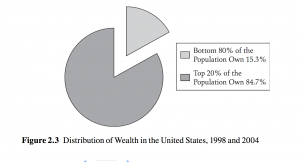While the lives of poorer children are at harm because of societal inequalities, so too are others, even individuals and families that are more well-off. The care and guidance of children is often thought of as a private affair – only affecting the families they are a part of. The assumption behind this perception is that individuals have children for their own personal reasons and benefit. Because neither the public nor the state play a role in this decision, children and their raising should be the sole responsibility of their parents. It is commonly thought that other people’s’ children have little effect on the lives of others and are therefore unimportant to society as a whole (Shelby 164-167). This misconception is a large contributor to the deterioration of society as a whole, not just poor families, because children have public consequences, regardless of how or where they are brought up. Children are the future workforce of America and are key elements in the material production of society. Similarly, the work of the young benefits the old, just as the work of adults benefit children. Children raised properly are also more likely to be law-abiding citizens. Similarly, because one’s natural ability is not a result of how a child is raised, working to raise all children to the best of society’s ability allows more capable workers to enter the workforce. Although the reasons behind procreation are often not based on the presumption that it will be to the betterment of society, the outcomes usually are. “Children, once they become adults, benefit everyone in society,” but conversely, people’s tendency to act in their own self-interest and view children as a private concern negatively impacts poorer families as well as all of society (Shelby 167).
Culture of Poverty
It is extremely difficult for a low-income family to change their circumstance because of the “culture of poverty.” Because poor families “have lived so long under such miserable conditions, many come to develop attitudes, practices, and self-conception that inhibit to improve their life prospects” or that of their children” (Shelby 8). Children in poorer families are especially vulnerable to succumbing to these negative influences, making it increasingly more difficult for them to break the poverty cycle, keeping them in the poor sector and inhibiting their ability to become successful. Parents want what is best for their children, but because of the culture of poverty, they often are prevented from changing their circumstances. Without outside aid, children acquire their parents’ circumstances automatically. So from the very beginning of a child’s life, because of societal and institutional inequalities that contribute to the culture of poverty, children in poorer families are ill-fated and lack the resources necessary to become successful, regardless of ability or aspiration.
Lacking Money and Time
As the Inequality gap between the wealthy and poor grows, those who have fewer means must spend less on their children. Figure 2 depicts the growing spending gap between wealthier and poorer families. The top decile of household income has been able to spend more than twice the amount of money in 2010 on their children than the same group did in 1970, while the bottom decile of household income saw little or no increase in spending on children.
 (Figure 2)
(Figure 2)
Without as much income, parents in low-income households must spend more time working, and thus less time with their children. Furthermore, a smaller income inhibits the abilities of parents to spend on childcare services. Because individuals tend to be wealthier after receiving a college degree versus those with a high school diploma, Figure 3 shows the distinction in time spent with children based on education status. There is a clear difference in time spent with children, where more educated parents spend over 40 more minutes per day with their children. “About seven-in-ten (71%) parents with a bachelor’s degree say they read to their young children every day, compared with 47% of those with some college and 33% of those with a high school diploma or less” (Hughes). Although reading time spent with children is only one example of the distinction between the total time parents spend with their children based on social classes, it is indicative of American culture as a whole.
 (Figure 3)
(Figure 3)
This is a major problem because it inhibits the ability for children to become successful. Research has shown that the more interaction a child has with its parents or in childcare, the more likely she or he is to succeed in school, a precursor to later life success (Collie and Martin 1). Without the resources to provide children with this interaction, children born in poorer families are obstructed from later life success from the beginning.
Growing Inequality Between the Wealthy and Poor
America has fallen short of being a just society because of increasing inequalities between those in the top 20% of the wealth in America and those in the bottom 80%. The distribution of wealth in America between 1998 and 2004 is depicted below in Figure 1.
 (Figure 1)
(Figure 1)
Those in the bottom 80% of the wealth in America are now less able to financially support their children than in the past, and because wealth and effective child-rearing practices go hand in hand, these parents also struggle to raise their children to be as successful as possible. This inequality that is leading slowly but inexorably toward a caste system of the “haves” and “have-nots,” which severely inhibits the abilities of children in poorer families to become successful because of birth position and inability of parents to raise their children effectively (due to circumstance and lack of information or ability), even if the child’s natural abilities are at par or exceed those of more well-off children.
Sample Post for the Problem
Here is a sample post for the Problem page